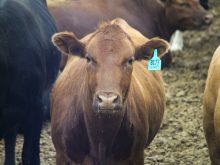Taking good care of animals is a top priority for most livestock producers, one they grew up with and practise daily. But somewhere along the line that message has gotten lost, says Dr. Allan Preston. Today it is consumers, animal activists and the corporate world who have taken over the driver’s seat.
“That shouldn’t happen,” says Preston, the keynote speaker at the 2011 Livestock Care Conference, hosted by Alberta Farm Animal Care (AFAC) in early April. A self-described, “burned-out country vet and part-time cowboy, masquerading as a senior bureaucrat,” Preston is an assistant deputy minister with Manitoba Agriculture, Food and Rural Initiatives. He isn’t afraid to challenge everyone to be better, from commodity organizations to professional organizations, including his own, the Canadian Veterinary Medical Association.
Read Also

Farming Smarter receives financial boost from Alberta government for potato research
Farming Smarter near Lethbridge got a boost to its research equipment, thanks to the Alberta government’s increase in funding for research associations.
“Friends tell you what you need to hear, not just what you want to hear,” says Preston. “All of us in the room have been and still are animal-welfare advocates. But the reality is, we haven’t made as much progress as we could have. We live and work in a social and political environment where less than two per cent of our population has any real connection to the farm and the other 98 per cent are driving the agenda for us. We still have the opportunity to be the leaders, but now is the time to accelerate that role.”
Preston says farm animal care is increasingly tied closely to everything from premium market opportunities and international trade standards to on-farm productivity and food safety. New expectations and added-value market potential are fuelled by everyone from consumers to major retailers such as McDonalds and Safeway, to heavyweight international bodies such as the World Organization for Animal Health (OIE).
Europe has led the change with a range of initiatives, such as banning battery cages and sow gestation stalls, while Canada continues to play catch-up. “What this means for trade is an important question we have to think about,” says Preston. “It hasn’t happened yet, but I would say those who don’t believe animal-welfare issues will become non-tariff trade barriers are dreaming in Technicolor.”
Picking up the pace
Preston says Canada has many examples of good initiatives such as national codes of practice and a growing list of producers and companies who are pioneering welfare-based marketing opportunities. Commodity groups have also made significant progress. However there is a lot more that can be done, a lot faster.
Preston cites plans by Manitoba Egg Farmers to phase out battery cages by 2018 and by the Manitoba Pork Council to phase out gestation stalls by 2025. “I guess my question is can we wait that long to make a change?” says Preston.
The opportunity is there for the taking, he says. But it requires meeting rising expectations for industry-wide standards backed by transparency and accountability. The battle over traceability, he says, is another good example of where Canada needs to stop spinning its wheels and get moving.
“It’s not enough to say we’re doing good things, we have to show it,” says Preston. “The only challenge we face is trying to overcome some of our entrenched attitudes. One is our concern that traceability – tracing back to the farm – will somehow cause us some problems. In my humble opinion it will in fact help us to an enormous degree.”
Opportunity to “prosper and profit”
Preston says consumers are becoming more vocal in speaking with their food dollar, looking for value-added products that are raised, transported and slaughtered humanely. “They’re also willing to pay a premium for products that provide assurances of meeting those demands.”
An elephant in the room for the livestock industry is how to deal with intensive livestock operations and confinement operations, he says.
“Are animals in those environments healthier and happier? You tell me.”
“Sadly our professional organizations like CVMA, as well as federal and provincial governments, have been guilty of lack of leadership as well. They have chosen to remain largely silent in this debate. By remaining silent and simply pointing to the need for science, we’ve lost some of the high moral ground to the animal activists and to the corporate world. They have been much quicker to move forward in response to public and consumer opinion.”
Preston cautioned that his talk was intended as tough love to spark the industry to the level of progress he knows it can achieve. He believes livestock producers have lost spring in their step by being portrayed as losing ground in an area where they traditionally have shown great leadership and pride. It’s a feeling Preston understands and one he says is time to turn around.
“As a livestock producer and veterinarian and animal scientist I take the animal-welfare covenant very seriously,” says Preston. “I grew up on a farm in an atmosphere where care for our animals was the first priority. Healthy, contented livestock put food on our table, clothes on our back and a roof over our head. We do raise livestock for our use as food and fibre. There’s no moral or ethical dilemma in doing that .
“Putting humanely raised, safe, nutritious meat on the table for Canadians is indeed a noble occupation for all of us.”
———
“Ithasn’thappened yet,butIwouldsay thosewhodon’tbelieve animal-welfareissues willbecomenon-tariff tradebarriers aredreamingin Technicolor.”
ALLAN PRESTON














